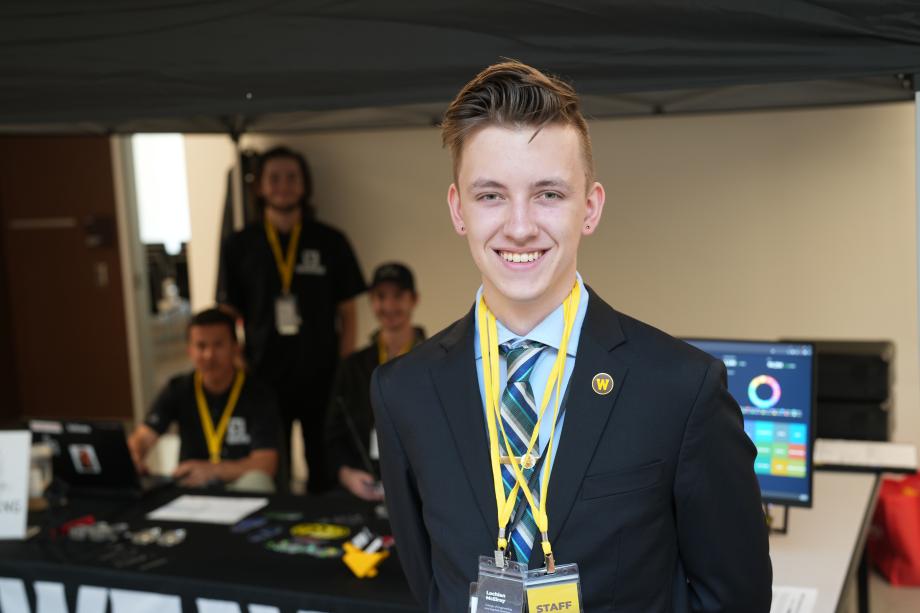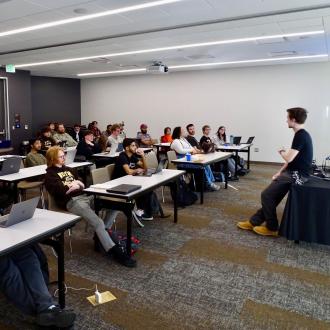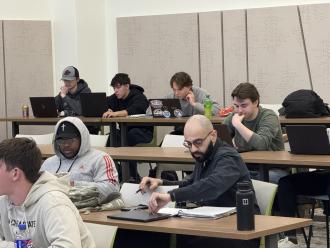Lending a hacking hand: ambitious students create real-world cybersecurity RSO
KALAMAZOO, Mich.—A Western Michigan University residence hall was the birthplace of several ideas for cybersecurity students Lochlan McElroy and Fin Burns. From weekend plans around Kalamazoo, to future goals at the University, McElroy and Burns were always thinking of unique ways to make the most of their first year at Western in 2024.
Their biggest idea? Creating the registered student organization (RSO) and nonprofit Western Research Advisory for Vulnerabilities, Exploits & Networks, or WRAVEN.
“We run hands-on projects, threat analyses and education,” says McElroy. “Our goal is to build a community where students learn real, hands-on, technical skills, while also making WMU and Kalamazoo more cyber-safe.”
WRAVEN focuses on linking classroom learning to real-world applications and building community connections. At its core, WRAVEN is a research and training group—its members conduct threat reports on current cybersecurity events, hold workshops and perform assessments.
“One of our main goals is to provide hands-on experience with the same hardware and software used by professionals in the industry,” says Burns. “We have access to resources and expertise that go beyond the classroom, helping enhance the college curriculum in a way that’s fun and engaging for everyone.”
The group operates as a nonprofit organization via national 501(c)(3) nonprofit Hack Foundation’s Hack Club Bank (HCB) project, which offers fiscal sponsorship to hacking clubs at educational institutions across the country. As a subsidiary of the Hack Foundation, WRAVEN gained access to its own nonprofit benefits to offer services to small businesses.
“We help local small businesses with free cybersecurity assessments, publish free public advisories and provide education to students through workshops and labs,” says McElroy. “We’re still a research-driven group, so not all our work looks like a ‘traditional nonprofit,’ but everything we do is aimed at improving cybersecurity for the community and beyond.”
Creating a digital wave
The idea of WRAVEN developed when McElroy and Burns were first looking for a place on Western’s campus to put their cybersecurity abilities to use. McElroy was hooked on the concepts of the Offensive Security, Incident Response and Internet Security (OSIRIS) Lab at New York University and CTF (Capture the Flag) teams around the country, which allow students to use their hacking skills in practice.
“I wanted to capture that same level of skill and excitement, but make it accessible to WMU students,” says McElroy.
With the eager energy of WMU’s student hackers, recruiting members for WRAVEN was simple. McElroy and Burns shared their ideas in classes and spread the news of WRAVEN via word-of-mouth, quickly building a team of around 40 students.
“I had been in a class with (McElroy and Burns), and they told me about this club, which is something I was interested in,” says cybersecurity student Abby Bayer, who is the group’s social media manager. “Joining this club was a no-brainer, since I was on the lookout for a cybersecurity club.”
“(McElroy and Burns) were both advertising the club in one of my classes and they seemed really ambitious to grow the cyber program here at WMU, so it also lit a fire under me to help out,” says cybersecurity student Eli Steinman, the team’s compliance lead and an executive board member. “Since joining, our ambitions have only grown and the projects we have been working on have exceeded all my expectations.”
Since its inception, WRAVEN has launched WATCHTOWER, a live threat intelligence dashboard, published research on major advanced persistent threat groups and hosted a four-week lecture series that prepared students to pass the ISC2 certification exam.
In August, members attended a DEFCON 33 Hacking Conference, which is the world’s biggest hacking convention held in Las Vegas. Through this event, the organization gained several partnerships that are helping them advance.
DEFCON 33 assisted in WRAVEN become the first Michigan member of the Electronic Frontier Foundation’s (EFF) Electronic Frontier Alliance, an information-sharing network that allows students to work closely with EFF to gain resources such as speakers or promotion of events. WRAVEN also joined the BugCrowd college program, which stems from the digital crowdsourced cybersecurity platform. This program sends speakers to university organizations to provide professional training for members at no cost and provides resources like software and information from BugCrowd’s program manager.
Currently, the group is building an active CTF team, which focuses on hacking exercises in cybersecurity for competitions. WRAVEN is also sponsoring the 2025 WMU Cybersecurity Summit.
“Cybersecurity is a very experience-based field,” says Burns. “Through WRAVEN, we’re helping to make sure students are prepared for both the theory and the real-world side of cyber.”
Defending data and constructing community
For WRAVEN, success comes with comradery. Bayer emphasized the way that the group works together to not only advance in cybersecurity, but also to find common interests with people at WMU.
“Another thing I love is how passionate others are in the club,” says Bayer. “We love to teach others about cybersecurity and different tools that could be used, helping each other out.”
WRAVEN encourages any student to join its ranks, regardless of cybersecurity or hacking experience.
“Anybody who is interested in cybersecurity, hacking or protecting anyone from hackers should join!” says Steinman. “We will teach anyone anything they are curious about relating to cybersecurity, and it doesn’t matter their background or experience level.”
“In the future, we want more students from non-technical majors, because cybersecurity impacts everyone,” says McElroy.
For McElroy, WRAVEN is bigger than just cybersecurity. It’s also about creating experiences for students.
“The bigger vision is to build an organization that draws people to WMU,” says McElroy.
Students interested in joining WRAVEN can attend a weekly meeting on Mondays at 6 p.m. in 2225 Kohrman Hall or join via ExperienceWMU.
For more information, visit WRAVEN’s website.
For more WMU news, arts and events, visit WMU News online.




